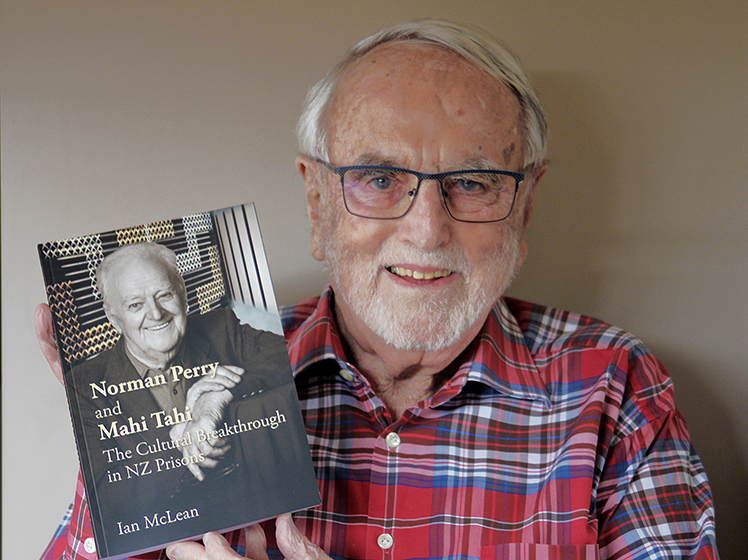Landmark book tells of Māori cultural breakthrough in prisons

TRANSFORMATIVE: Ian McLean has written a book about the breakthrough of Māori culture into New Zealand prisons, an initiative started by Norman Perry and the Mahi Tahi Akoranga Trust. Photos supplied
Kathy Forsyth
AUTHOR and former MP Ian McLean has unveiled his latest book, Norman Perry and Mahi Tahi – The Cultural Breakthrough in New Zealand Prisons, which delves into a transformative initiative that began almost 30 years ago, connecting Māori culture with the rehabilitation of inmates.
Published by CopyPress, this compelling work illustrates how reconnecting Māori prisoners with their cultural heritage has paved the way for more fulfilling, crime-free lives.
The book chronicles the pioneering efforts of the late Norman Perry, under whose leadership the Mahi Tahi Akoranga Trust was established.
Under the Radar, a programme to help Māori prisoners, has operated successfully for 25 years, significantly improving inmate behaviour and attitudes while focusing on tikanga (custom) and Māoritanga (Māori culture).
McLean explains that the roots of this cultural shift can be traced back to Sir Āpirana Ngata and the guidance he and other Māori elders provided to Perry, who built this kaupapa into the Mahi Tahi Akoranga Trust and took the plan into prisons.
For the first time, the book recounts Perry’s remarkable life and the cultural breakthrough that took place within the prison system.
McLean, who dedicated three years to writing the book, shared his motivation: “I wanted to document what I knew about Norman and the Mahi Tahi Trust, especially as many of the original participants have since passed away.”
Perry, a key figure in Ōpōtiki, was a lay missionary who became a bridge between Māori and Pākehā communities. His work as a rehabilitation officer in post-WWII New Zealand saw him become the only Pākehā designated as a Māori welfare officer.
Perry’s contributions were pivotal in various local organisations, including the Māori Council in the early 1960s.

“He was knighted, one of the few knights and dames from the Eastern Bay.”
One of the book’s significant findings centres around the Roper Committee’s recommendations, which emphasised the failures of the Westminster system in addressing Māori issues and advocated for adopting Māori cultural practices in rehabilitation.
As a result, the Mahi Tahi Akoranga Trust was formed, with Perry leading the charge and McLean serving as a trustee for 25 years.
The legacy of this trust was profound, McLean said.
“It successfully ‘broke into prison,’ as Norman would say it,” bringing a tikanga and Māoritanga programme into the correctional system. The first wānanga (cultural workshop) held in a prison occurred in Hawke’s Bay in 1965, setting a precedent for future initiatives.
The enduring importance of culturally relevant programmes in prisons is highlighted: “No social programme can be culturally neutral.
“To be effective, they must resonate with the cultural backgrounds of the participants. This insight is critical not just for prisons but for all social programmes.”
The first wānanga had such an impact on the behaviour and attitudes of the people who participated that the concept spread quite rapidly throughout prisons, McLean said.
“There are now, right across New Zealand prisons, tikanaga programmes, run by iwi.
“It is not easy to do it in prisons, but it has survived.”
With a background rooted in the Eastern Bay, McLean served as the MP for Tarawera from 1978 to 1990 and has been actively involved in various community initiatives. He was honoured with a QSO in 1991 for his services.
His latest work, Norman Perry and Mahi Tahi Trust – The Cultural Breakthrough in NZ Prisons, is now available at Paper Plus, offering readers valuable insights into a significant chapter of New Zealand’s cultural history.